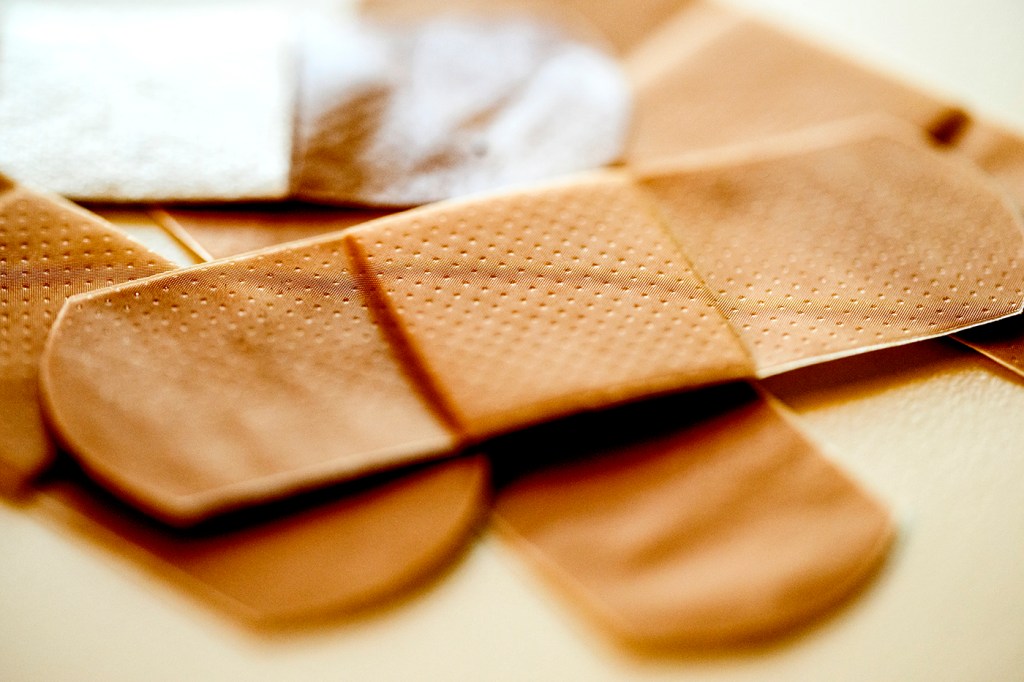Report says Band-Aids contain PFAS, the ‘forever chemicals.’ Many small exposures can add up to a big exposure, environmental expert warns
The EPA established national limits for PFAS in drinking water on Wednesday, but PFAS can also be found in bandages, cosmetics, deodorants, toilet paper and menstrual products, Northeastern professor Phil Brown says.

Adhesive bandages, or Band-Aids as they are generally called after the brand produced by Johnson & Johnson, have been keeping our cuts, scrapes or blisters protected from bacteria, damage and dirt for more than a century.
But a new consumer report, commissioned by Mamavation, an online parenting community and website, has found they may not be as helpful as once thought. In fact, they might actually be harmful to our health.
Partnering with Environmental Health News, the consumer watchdog sent 40 bandages of different brands to a U.S. Environmental Protection Agency-certified lab. The lab found that 65% of the bandages contained detectable levels of synthetic “forever chemicals,” or PFAS.
Such consumer reports raise awareness that many personal care products might contain these chemicals and incentivize policymakers to come up with regulations, says Phil Brown, a Northeastern distinguished professor of sociology and health science, and director of the university’s Social Science Environmental Health Research Institute.
Bandages, Brown says, just like menstrual products, can be used on very sensitive areas of the body where PFAS can easily be absorbed.

“You’re usually putting them on an open wound. That’s what they’re for,” he says.
It may be a small area overall, Brown says, and maybe that scrape closes up in two or three days, but some people use plastic bandages a lot.
“Even if you think this is a small exposure, you add up a lot of small exposures, [and] you have a big exposure,” he says.
The Environmental Protection Agency established national limits for six types of PFAS in drinking water on Wednesday, but PFAS have been found in cosmetics, deodorants, toilet paper and menstrual products, he says.
“People are getting a lot of different exposures from their everyday personal care products,” Brown says.
Per- and polyfluoroalkyl substances — known as PFAS — are a class of over 12,000 synthetic organic chemicals used in hundreds of consumer products and industrial applications such as nonstick and high-temperature resistant coatings, firefighting foams, and stain-resistant and waterproofing treatments. According to a recent article in Environmental Science and Technology, co-authored by Brown, these chemicals raise serious concerns among scientists because of their persistent use, toxicity, potential to accumulate in living organisms, mobility and even global warming potential.
PFAS have been linked to cancers, reproduction and developmental issues, liver and thyroid disease, and altered immune function. For decades, Brown says, people have been attributing the rise in cancers, as well as diabetes and many immune-related diseases to these endocrine-disrupting chemicals.
Brown says that the report was reviewed by highly respected experts in the environmental health field such as Linda Birnbaum, a scientist emeritus and former director of the National Institute of Environmental Health Sciences and National Toxicology Program.
Mamavation’s report was not able to separate the adhesive from the bandage in the lab, but found that the flaps had PFAS indicators present. PFAS were also found inside the absorbent pads.
Some companies, such as CVS, Brown says, might be buying whole bandages or parts of them from third-party vendors to sell under their own brand. They can claim that they don’t know about the use of PFAS in the final product, but those companies that manufacture them must know about the chemicals, he says.
“I think personally it’s every company’s responsibility to know what’s in the product,” Brown says. “And certainly once they hear that Band-Aids have PFAS, that even if they don’t make their own Band-Aids, they should be tracking down the supply chain.”
Currently, there are no federal regulations, Brown says, that require manufacturers to be transparent about PFAS in their products.
Maine lawmakers passed a first-in-the-nation bill two years ago to ban PFAS in all products sold in the state by 2030. In Massachusetts, Brown says, the environmental group the Alliance for Healthy Tomorrow has made its case for similar regulations.
“Once companies have to notify people, they will be much more on the alert,” he says.





